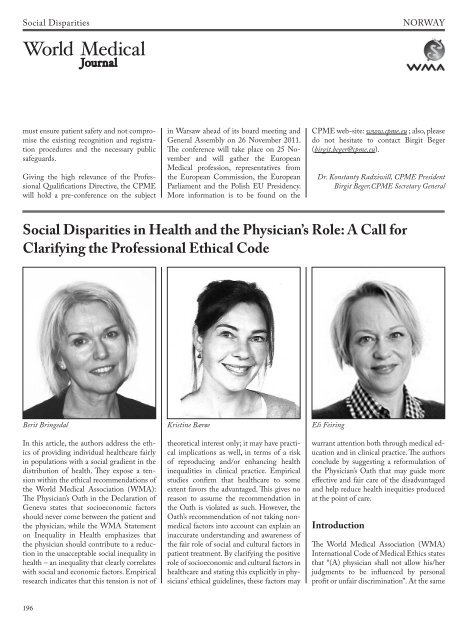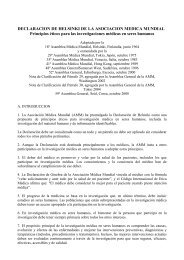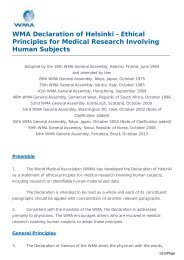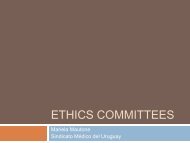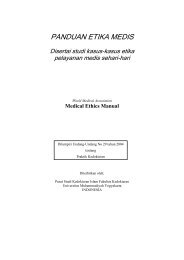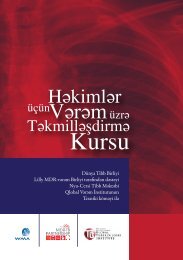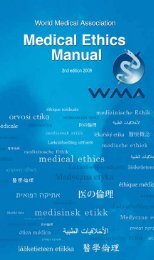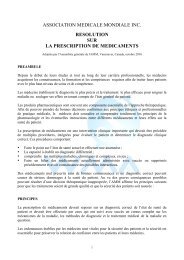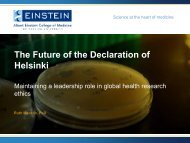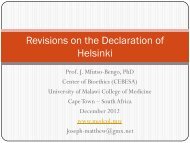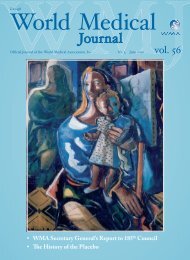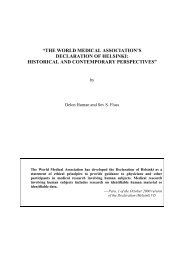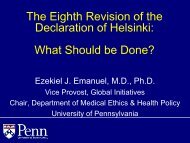WMJ 05 2011 - World Medical Association
WMJ 05 2011 - World Medical Association
WMJ 05 2011 - World Medical Association
You also want an ePaper? Increase the reach of your titles
YUMPU automatically turns print PDFs into web optimized ePapers that Google loves.
Social Disparities<br />
NORWAY<br />
must ensure patient safety and not compromise<br />
the existing recognition and registration<br />
procedures and the necessary public<br />
safeguards.<br />
Giving the high relevance of the Professional<br />
Qualifications Directive, the CPME<br />
will hold a pre-conference on the subject<br />
in Warsaw ahead of its board meeting and<br />
General Assembly on 26 November <strong>2011</strong>.<br />
The conference will take place on 25 November<br />
and will gather the European<br />
<strong>Medical</strong> profession, representatives from<br />
the European Commission, the European<br />
Parliament and the Polish EU Presidency.<br />
More information is to be found on the<br />
CPME web-site: www.cpme.eu ; also, please<br />
do not hesitate to contact Birgit Beger<br />
(birgit.beger@cpme.eu).<br />
Dr. Konstanty Radziwill, CPME President<br />
Birgit Beger,CPME Secretary General<br />
Social Disparities in Health and the Physician’s Role: A Call for<br />
Clarifying the Professional Ethical Code<br />
Berit Bringedal Kristine Bærøe Eli Feiring<br />
In this article, the authors address the ethics<br />
of providing individual healthcare fairly<br />
in populations with a social gradient in the<br />
distribution of health. They expose a tension<br />
within the ethical recommendations of<br />
the <strong>World</strong> <strong>Medical</strong> <strong>Association</strong> (WMA):<br />
The Physician’s Oath in the Declaration of<br />
Geneva states that socioeconomic factors<br />
should never come between the patient and<br />
the physician, while the WMA Statement<br />
on Inequality in Health emphasizes that<br />
the physician should contribute to a reduction<br />
in the unacceptable social inequality in<br />
health – an inequality that clearly correlates<br />
with social and economic factors. Empirical<br />
research indicates that this tension is not of<br />
theoretical interest only; it may have practical<br />
implications as well, in terms of a risk<br />
of reproducing and/or enhancing health<br />
inequalities in clinical practice. Empirical<br />
studies confirm that healthcare to some<br />
extent favors the advantaged. This gives no<br />
reason to assume the recommendation in<br />
the Oath is violated as such. However, the<br />
Oath’s recommendation of not taking nonmedical<br />
factors into account can explain an<br />
inaccurate understanding and awareness of<br />
the fair role of social and cultural factors in<br />
patient treatment. By clarifying the positive<br />
role of socioeconomic and cultural factors in<br />
healthcare and stating this explicitly in physicians’<br />
ethical guidelines, these factors may<br />
warrant attention both through medical education<br />
and in clinical practice. The authors<br />
conclude by suggesting a reformulation of<br />
the Physician’s Oath that may guide more<br />
effective and fair care of the disadvantaged<br />
and help reduce health inequities produced<br />
at the point of care.<br />
Introduction<br />
The <strong>World</strong> <strong>Medical</strong> <strong>Association</strong> (WMA)<br />
International Code of <strong>Medical</strong> Ethics states<br />
that “(A) physician shall not allow his/her<br />
judgments to be influenced by personal<br />
profit or unfair discrimination”. At the same<br />
196


